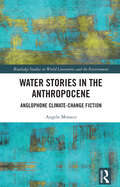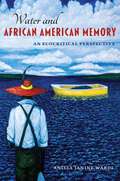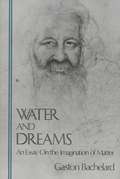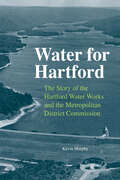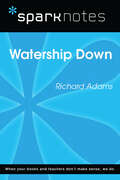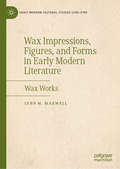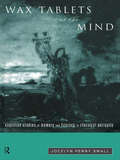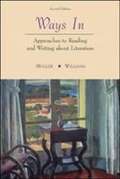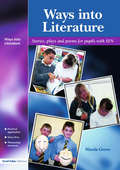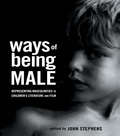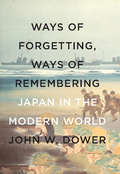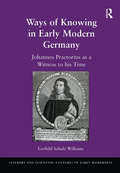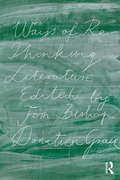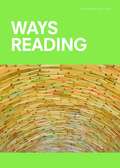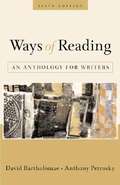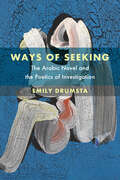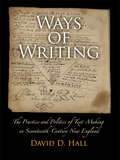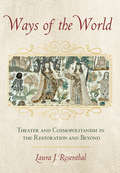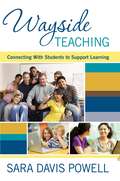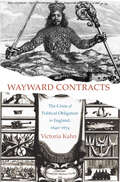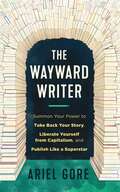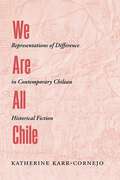- Table View
- List View
Water Stories in the Anthropocene: Anglophone Climate-Change Fiction (Routledge Studies in World Literatures and the Environment)
by Angelo MonacoWater Stories in the Anthropocene explores how climate change has emerged as a major theme in our daily lives as it poses a myriad of economic, scientific, political and cultural challenges in the age of the Anthropocene. In all its forms and manifestations, climate change is primarily a water crisis. Water scarcity, droughts, floods, deluge, rising sea levels, ice melting, wetlands loss and sea pollution are among the main threats posed by climate change, wreaking havoc on both human and nonhuman forms of life. This book engages with instances of extreme events related to water (droughts, floods, deluges) and the impact of climate change on some waterbodies (seas and wetlands) in contemporary Anglophone novels. By taking into account a corpus of novels ranging from the various areas of the Anglophone world, and thus shuttling between the Global North and the Global South, the book reads these novels as "water stories." This volume pays attention to the pervasive presence of water in all aspects of our lives, thus showing how narratives can offer insightful accounts of the present water crisis. Alternating between an econarratological perspective, reflections on the Anthropocene and the human/nonhuman imbrications within the blue humanities, the book contributes significantly to the considerations of the imaginative possibilities of these water stories, showing how narratives can offer insightful accounts of the present water crisis.
Water and African American Memory: An Ecocritical Perspective
by Anissa J. WardiWhile there is no lack of scholarship on the trans-Atlantic voyage and the Middle Passage as tropes in African diasporic writing, to date there has not been a comprehensive analysis of bodies of water in African American literature and culture.In Water and African American Memory, Anissa Wardi offers the first sustained treatise on watercourses in the African American expressive tradition. Her holistic approach especially highlights the ways that water acts not only as a metaphorical site of trauma, memory, and healing but also as a material site.Using the trans-Atlantic voyage as a starting point and ending with a discussion of Hurricane Katrina, this pioneering ecocritical study delves deeply into the environmental dimension of African American writing. Beyond proposing a new theoretical map for conceptualizing the African Diaspora, Wardi offers a series of engaging and original close readings of major literary, filmic, and blues texts, including the works of Toni Morrison, Ntozake Shange, Julie Dash, Henry Dumas, and Kasi Lemmons.
Water and Dreams: An Essay on the Imagination of Matter
by Gaston BachelardGaston Bachelard, master dreamer of the elements, animates the waters of the soul with his stirring, fluid imagination. With the subtlety of a poet, he ranges from the surface of water with its reflective narcissism to the very depths where water flows into death. Clear waters, deep water, the Charon Complex, water in combination with other elements, maternal waters, water's morality, violent water, water's voice.
Water for Hartford: The Story of the Hartford Water Works and the Metropolitan District Commission (Garnet Books)
by Kevin MurphyHow three men brought clean water to Hartford, on a massive scale As good health is inextricably wedded to pure drinking water—and this particular concern looms larger every day—understanding delivery systems is almost as important as the water itself. Water for Hartford chronicles the century-long effort, beginning in the 1850s, to construct a viable, efficient water system. The story of Hartford's water works is a fascinating one, for it recalls the hard work, great sacrifice, and extraordinary engineering feats necessary to deliver wholesome drinking water to a growing urban center. It also illuminates the ever-changing social, political, and economic milieu in which it was built. The story of its construction is also the story of three men—Hiram Bissell, Ezra Clark, and Caleb Saville. Readers are transported back in time and given a firsthand glimpse of what these champions of a water system faced on a daily basis: unforgiving geography, venal politicians, and an often-indifferent public. The book culminates in the exhilaration of having built a water works from scratch to deliver clean, safe drinking water to the masses. Water for Hartford is a human story, peopled by men of vision and achievement, who understood that their decisions and actions would affect millions of people for decades to come.
Watership Down (SparkNotes Literature Guide Series)
by SparkNotesWatership Down (SparkNotes Literature Guide) by Richard Adams Making the reading experience fun! Created by Harvard students for students everywhere, SparkNotes is a new breed of study guide: smarter, better, faster. Geared to what today's students need to know, SparkNotes provides: *Chapter-by-chapter analysis *Explanations of key themes, motifs, and symbols *A review quiz and essay topicsLively and accessible, these guides are perfect for late-night studying and writing papers
Wax Impressions, Figures, and Forms in Early Modern Literature: Wax Works (Early Modern Cultural Studies 1500–1700)
by Lynn M. MaxwellThis book explores the role of wax as an important conceptual material used to work out the nature and limits of the early modern human. By surveying the use of wax in early modern cultural spaces such as the stage and the artist’s studio and in literary and philosophical texts, including those by William Shakespeare, John Donne, René Descartes, Margaret Cavendish, and Edmund Spenser, this book shows that wax is a flexible material employed to define, explore, and problematize a wide variety of early modern relations including the relationship of man and God, man and woman, mind and the world, and man and machine.
Wax Tablets of the Mind: Cognitive Studies of Memory and Literacy in Classical Antiquity
by Jocelyn Penny SmallIn this volume, the author argues that literacy is a complex combination of various skills, not just the ability to read and write: the technology of writing, the encoding and decoding of text symbols, the interpretation of meaning, the retrieval and display systems which organize how meaning is stored and memory. The book explores the relationship between literacy, orality and memory in classical antiquity, not only from the point of view of antiquity, but also from that of modern cognitive psychology. It examines the contemporary as well as the ancient debate about how the writing tools we possess interact and affect the product, why they should do so and how the tasks required of memory change and develop with literacy's increasing output and evoking technologies.
Ways In
by Gilbert H. Muller John A. WilliamsBridging the gap between literary and composition theory, Ways In is a concise, integrated guide to critical reading, thinking, and writing about literature.
Ways into Literature: Stories, Plays and Poems for Pupils with SEN
by Nicola GroveBy fostering an emotional engagement with literature, teachers can encourage children to make subsequent critical evaluations. Ways into Literature is in line with current guidelines and will help practitioners get started straight away by using the book's storylines, character maps, and story frames. It will also help practitioners learn from the experiences of real children and fellow practitioners. Ways into Literature contains photocopiable and CD ROM resources.
Ways of Being Male: Representing Masculinities in Children's Literature (Children's Literature and Culture)
by John StephensGiven the substantial impact of feminism on children’s literature and culture during the last quarter century, it comes as no surprise that gender studies have focused predominantly on issues of female representation. The question of how the same patriarchal ideology structured representations of male bodies and behaviors was until very recently a marginal discussion. Now that masculinity has emerges as an overt theme in children’s literature and film, critical consideration of the subject is timely, if not long overdue Ways of Being Male addresses this new concern in an unprecedented collection of essays examining how contemporary debates about masculinity are reflected in fiction and film for young adults. An outstanding team of scholars elucidates the ways in which different versions of male identity are constructed and presented to young audiences. The contributors, drawn from a variety of academic disciplines, employ international discourses in literary criticism, feminism, social sciences, film theory, psychoanalytic criticism, and queer theory in their wide-ranging exploration of male representation. With its illuminating array of perspectives, this pioneering survey brings a long neglected subject into sharp focus.
Ways of Forgetting, Ways of Remembering: Japan in the Modern World
by John W. Dower&“A series of astute academic essays on the forging of postwar Japan&” from the winner of the Pulitzer Prize, National Book Award, and Bancroft Prize (Kirkus Reviews). Remembering and reconstructing the past inevitably involves forgetting—and nowhere more so than in the complex relationship between the United States and Japan since the end of World War II. In this provocative and probing series of essays, John W. Dower—one of our leading historians of postwar Japan and author of the Pulitzer Prize–winning Embracing Defeat—explores the uses and abuses to which this history has been subjected and, with deliberation and insight, affirms the urgent need for scholars to ask the questions that are not being asked. Using E. H. Norman, the unjustly neglected historian of prewar Japan, as a starting point, Ways of Forgetting, Ways of Remembering sets out both to challenge historiographical orthodoxy and reveal the configurations of power inherent in scholarly and popular discourse in Japan and America. It is a profound look at American and Japanese perceptions—past and present—of key moments in their shared history. An incisive investigation of the problems of public history and its role in a modern democracy, these essays are essential reading for anyone interested in postwar US-Japan relations, as well as the broader discipline of history. &“A set of serious, cautionary reflections from a superb historian.&” —Publishers Weekly (starred review)
Ways of Knowing in Early Modern Germany: Johannes Praetorius as a Witness to his Time (Literary and Scientific Cultures of Early Modernity)
by Gerhild Scholz WilliamsGerhild Scholz Williams's Ways of Knowing in Early Modern Germany: Johannes Praetorius as a Witness to His Time, reviews key discourses in eight of Praetorius's works. She introduces the modern reader to the kinds of subjects, the intellectual and spiritual approaches to them, and the genres that this educated and productive German scholar and polymath presented to his audience in the seventeenth century. By relating these individual works to a number of contemporaneous writings, Williams shows how Praetorius constructed a panorama in print in which wonders, the occult, the emerging scientific way of thinking, family and social mores are recurrent themes. Included in Praetorius's portrait of the mid-seventeenth-century are discussions of Paracelsus's scientific theories and practice; early modern German theories on witchcraft and demonology and their applications in the seventeenth century. Furthermore, we read about the early modern beginnings of ethnography, anthropology, and physical geography; gender theory, early modern and contemporary notions of intellectual property, and competing and sometimes conflicting early modern scientific and theological explanations of natural anomalies. Moreover, throughout his work and certainly in those texts chosen for this study, Praetorius appears before us as an assiduous reporter of contemporary European and pan-European events and scientific discoveries, a critic of common superstitions, as much a believer in occult causes and signs and in God's communication with His people. In his writings, in his way of telling, he offers strategies by which to comprehend the political, social, and intellectual uncertainties of his century and, in so doing, identifies ways to confront the diverse interpretive authorities and the varieties of structures of knowledge that interacted and conflicted with each other in the public arena of knowing.
Ways of Re-Thinking Literature
by Donatien Grau Tom BishopWays of Re-Thinking Literature creates a unique platform where leading literary thinkers and practitioners provide a multiplicity of views into what literature is today. The texts gathered in this extraordinary collection range from philosophy to poetry, to theater, to cognitive sciences, to art criticism, to fiction, and their authors rank amongst the most significant figures in their fields, in France, the United States, and the United Kingdom. Topics covered include an assessment of the role of literary narratives in contemporary writing, new considerations on the novel, a redefinition of the "poetic" factor in poetry and life, and a discussion of how literature engages with contemporary forms of individuality. Under the auspices of literary luminaries Hélène Cixous and the late John Ashbery, these new pieces of writing bring to light contributions by innovative and well-established authors from the English-speaking sphere, as well as never-before translated prominent new voices in French theory. Featuring original work from some of today’s most influential authors, Ways of Re-Thinking Literature is an indispensable tool for anybody interested in the future and possibilities of literature as an endeavor for life, thought, and creativity. With special cover artwork by Rita Ackermann, the volume includes contributions from Emily Apter, Philippe Artières, John Ashbery, Paul Audi, Dodie Bellamy, Tom Bishop, Hélène Cixous, Laurent Dubreuil, Tristan Garcia, Stathis Gourgouris, Donatien Grau, Boris Groys, Shelley Jackson, Wayne Koestenbaum, Camille Laurens, Vanessa Place, Maël Renouard, Peter Schjeldahl, Adam Thirlwell, and Camille de Toledo.
Ways of Reading: An Anthology for Writers
by David Bartholomae Anthony Petrosky Stacey WaiteSince its first edition, Ways of Reading has offered a uniquely exciting approach to first-year composition, integrating reading, writing, and critical thinking with a challenging selection of readings and editorial support. By engaging students in conversations with key academic and cultural texts, Ways of Reading helps students develop the intellectual skills necessary for academic work; it also bridges the gap between contemporary critical theory and composition so that instructors can connect their own scholarly work with their teaching. With a mix of shorter, more accessible readings from a broader range of academic disciplines, the eleventh edition offers more flexibility for instructors while continuing to help students become better writers by challenging them to be engaged and critical readers.
Ways of Reading: An Anthology for Writers (6th edition)
by David Bartholomae Anthony PetroskyMuch admired, widely adopted, and one-of-a-kind -- Ways of Reading combines lengthy and challenging readings with an innovative and demanding apparatus to engage students in conversations with some of the most powerful voices of our culture.
Ways of Seeking: The Arabic Novel and the Poetics of Investigation (Islamic Humanities #6)
by Emily DrumstaA free ebook version of this title is available through Luminos, University of California Press’s Open Access publishing program. Visit www.luminosoa.org to learn more. In Ways of Seeking, Emily Drumsta traces the influence of detective fiction on the twentieth-century Arabic novel. Theorizing a "poetics of investigation," she shows how these novels, far from staging awe-inspiring feats of logical deduction, mock the truth-seeking practices on which modern exercises of colonial and national power are often premised. Their narratives return to the archives of Arabic folklore, Islamic piety, and mysticism to explore less coercive ways of knowing, seeing, and seeking. Drumsta argues that scholars of the Middle East neglect the literary at their peril, overlooking key critiques of colonialism from the intellectuals who shaped and responded through fiction to the transformations of modernity. This book ultimately tells a different story about the novel’s place in the constellation of Arab modernism, modeling an innovative method of open-ended inquiry based on the literary texts themselves.
Ways of Writing
by David D. HallWriters abounded in seventeenth-century New England. From the moment of colonization and constantly thereafter, hundreds of people set pen to paper in the course of their lives, some to write letters that others recopied, some to compose sermons as part of their life work as ministers, dozens to attempt verse, and many more to narrate a remarkable experience, provide written testimony to a civil court, participate in a controversy, or keep some sort of records--and of these everyday forms of writing there was no limit.Every colonial writer knew of two different modes of publication, each with its distinctive benefits and limitations. One was to entrust a manuscript to a printer who would set type and impose it on sheets of paper that were bound up into a book. The other was to make handwritten copies or have others make copies, possibly unauthorized. Among the colonists, the terms "publishing" and "book" referred to both of these technologies. Ways of Writing is about the making of texts in the seventeenth century, whether they were fashioned into printed books or circulated in handwritten form. The latter mode of publishing was remarkably common, yet it is much less understood or acknowledged than transmission in print. Indeed, certain writers, including famous ones such as John Winthrop and William Bradford, employed scribal publication almost exclusively; the Antimonian controversy of 1636-38 was carried out by this means until manuscripts relating to the struggle began to be printed in England.Examining printed texts as well as those that were handwritten, David D. Hall explores the practices associated with anonymity, dedications, prefaces, errata, and the like. He also surveys the meaning of authority and authenticity, demonstrating how so many texts were prepared by intermediaries, not by authors, thus contributing to the history of "social" or collaborative authorship. Finally, he considers the political contexts that affected the transmission and publication of many texts, revealing that a space for dissent and criticism was already present in the colonies by the 1640s, a space exploited mainly by scribally published texts.
Ways of the World: Theater and Cosmopolitanism in the Restoration and Beyond
by Laura J. RosenthalWays of the World explores cosmopolitanism as it emerged during the Restoration and the role theater played in both memorializing and satirizing its implications and consequences. Rooted in the Stuart ambition to raise the status of England through two crucial investments—global traffic, including the slave trade, and cultural sophistication—this intensified global orientation led to the creation of global mercantile networks and to the rise of an urban British elite who drank Ethiopian coffee out of Asian porcelain at Ottoman-inspired coffeehouses. Restoration drama exposed cosmopolitanism's most embarrassing and troubling aspects, with such writers as Joseph Addison, Aphra Behn, John Dryden, and William Wycherley dramatizing the emotional and ethical dilemmas that imperial and commercial expansion brought to light.Altering standard narratives about Restoration drama, Laura J. Rosenthal shows how the reinvention of theater in this period—including technical innovations and the introduction of female performers—helped make possible performances that held the actions of the nation up for scrutiny, simultaneously indulging and ridiculing the violence and exploitation being perpetuated. In doing so, Ways of the World reveals an otherwise elusive consistency between Restoration genres (comedy, tragedy, heroic plays, and tragicomedy), disrupts conventional understandings of the rise and reception of early capitalism, and offers a fresh perspective on theatrical culture in the context of the shifting political realities of seventeenth- and eighteenth-century Britain.
Ways with Words: Language, life, and work in communities and classrooms
by Shirley Brice HeathWays with Words is a classic study of children learning to use language at home and at school in two communities only a few miles apart in the south-eastern United States. 'Roadville' is a white working-class community of families steeped for generations in the life of textile mills; 'Trackton' is an African-American working-class community whose older generations grew up farming the land, but whose existent members work in the mills. In tracing the children's language development the author shows the deep cultural differences between the two communities, whose ways with words differ as strikingly from each other as either does from the pattern of the townspeople, the 'mainstream' blacks and whites who hold power in the schools and workplaces of the region. Employing the combined skills of ethnographer, social historian, and teacher, the author raises fundamental questions about the nature of language development, the effects of literacy on oral language habits, and the sources of communication problems in schools and workplaces.
Wayside Teaching: Connecting with Students to Support Learning
by Sara Davis PowellWayside teaching is about intentionally practicing what educators do every day in perhaps unintentional ways: relate to students. This practical, research-based guide illustrates how wayside teaching—the informal curriculum, implicit instruction, and mentoring that happens in sometimes unintentional ways—can be intentionally practiced across grade levels to enhance learning and boost student outcomes. Through a framework focused on attitudes, approaches, and actions, and using vignettes that illuminate wayside teaching in action, Sara Davis Powell demonstrates how reaching out to students in formal and informal situations helps create a culture of belonging and safety that strengthens a student’s self-image, confidence, resiliency, and cognitive processes. Offering invaluable resources, including student surveys for learning more about your students and an annotated booklist for promoting acceptance and compassion, Wayside Teaching reflects the powerful influence that teachers’ actions can have on their students’ academic and personal lives.
Wayward Contracts: The Crisis of Political Obligation in England, 1640-1674
by Victoria KahnWhy did the language of contract become the dominant metaphor for the relationship between subject and sovereign in mid-seventeenth-century England? In Wayward Contracts, Victoria Kahn takes issue with the usual explanation for the emergence of contract theory in terms of the origins of liberalism, with its notions of autonomy, liberty, and equality before the law. Drawing on literature as well as political theory, state trials as well as religious debates, Kahn argues that the sudden prominence of contract theory was part of the linguistic turn of early modern culture, when government was imagined in terms of the poetic power to bring new artifacts into existence. But this new power also brought in its wake a tremendous anxiety about the contingency of obligation and the instability of the passions that induce individuals to consent to a sovereign power. In this wide-ranging analysis of the cultural significance of contract theory, the lover and the slave, the tyrant and the regicide, the fool and the liar emerge as some of the central, if wayward, protagonists of the new theory of political obligation. The result is must reading for students and scholars of early modern literature and early modern political theory, as well as historians of political thought and of liberalism.
Wayward Writer, The: Summon Your Power to Take Back Your Story, Liberate Yourself from Capitalism, and Publish Like a Superstar
by Ariel GoreWhen your dream and creative passion is to write, how do you succeed without selling out or selling yourself short? Ariel Gore has spent her life trying to solve this puzzle, writing and organizing her way towards a creative utopian vision, where storytelling is a form of resistance and writing is an outsider art. In this follow-up to her national bestseller How to Become a Famous Writer Before You're Dead, Gore offers a lyrical call to literary revolution paired with practical exercises. Through her own experiences and interviews with other authors, publishers, and agents, she shows you how to chart your own creative education, vanquish shame and imposter syndrome, cast off oppression, cast a spell on your readers, step into your unique powers, and build your own literary community where respect and honesty reign and where you can be a writer and survive. Gore presents an alternative narrative structure to the patriarchal hero's journey, with a focus on tapping into myths and hidden places. She urges us to not be precious about where or when we write, or to apologize for who and what we are, or to stop short of telling the truth about our lives. The result is an impossible to ignore rallying cry for writing dangerously to create a liberatory literary utopia and a helpful guide through the thorny landscape of publishing your work.
We Are All Chile: Representations of Difference in Contemporary Chilean Historical Fiction (Path to Open)
by Katherine Karr-CornejoA study of the relationship between literature and the current conditions of national life, We Are All Chile explores how artistic expression reflects lived experience. The book travels through figures, symbols, and events in Chilean history from the sixteenth to the end of the nineteenth centuries as represented through historical fiction of the late twentieth and early twenty-first centuries, an oeuvre that uses historical stories to reflect upon the challenges of Chilean society post-dictatorship. Contrasting the use of these stories with previous understanding highlights the power of legacies of the dictatorial authoritarian state, particularly as they shape possibilities for the full flourishing of people without regard for their minoritized or disadvantaged identities, such as their sex, sexual orientation, ethnicity, or race.This treatment of Chilean history and culture brings together literature and historiography to offer powerful interpretations of cultural narratives. The focus on varied dimensions of difference illustrates both overlapping representations and distinctive features of each within narratives imagining a more inclusive community. Throughout We Are All Chile, historical narratives and their source material are connected to support the creation of imaginative space for a better and more expansive future. The stories studied highlight the relationships between gender, empire, and the body; performances of race and gender that evoke a utopian dream of coexistence; symbols and systems of the nation as reflections of authoritarian practices; the legibility of the claims of indigenous communities; the role of violence in community building; and the strategies of lament inherent in the repeated stories of dreams for a more inclusive future shattered on the structures of exclusion. These historical narratives alone cannot change the material conditions in which people live, but they can awaken hope for the future that can inspire change. And it is this very process of defending, questioning, challenging, and changing historical stories that opens the door to possibility.
